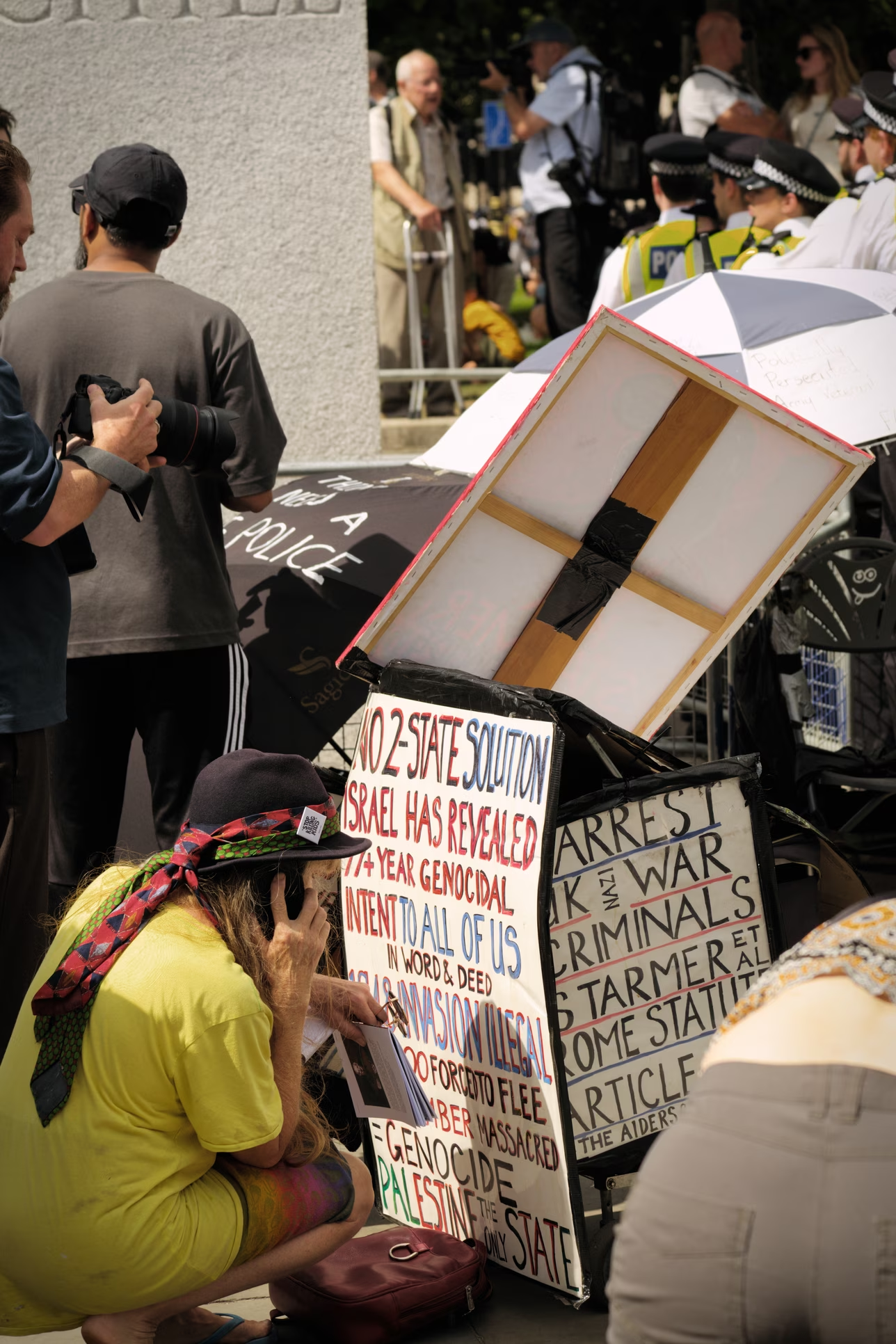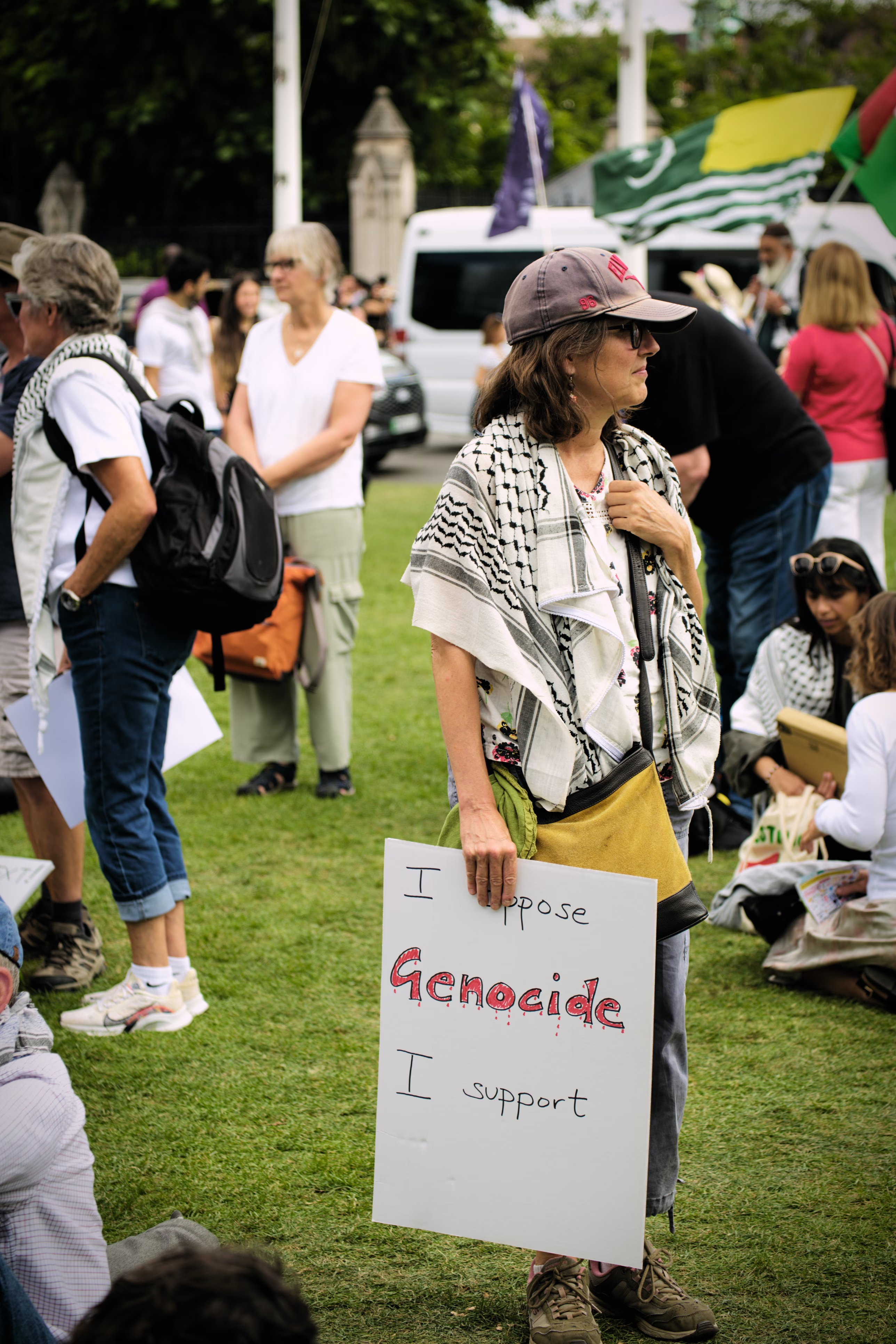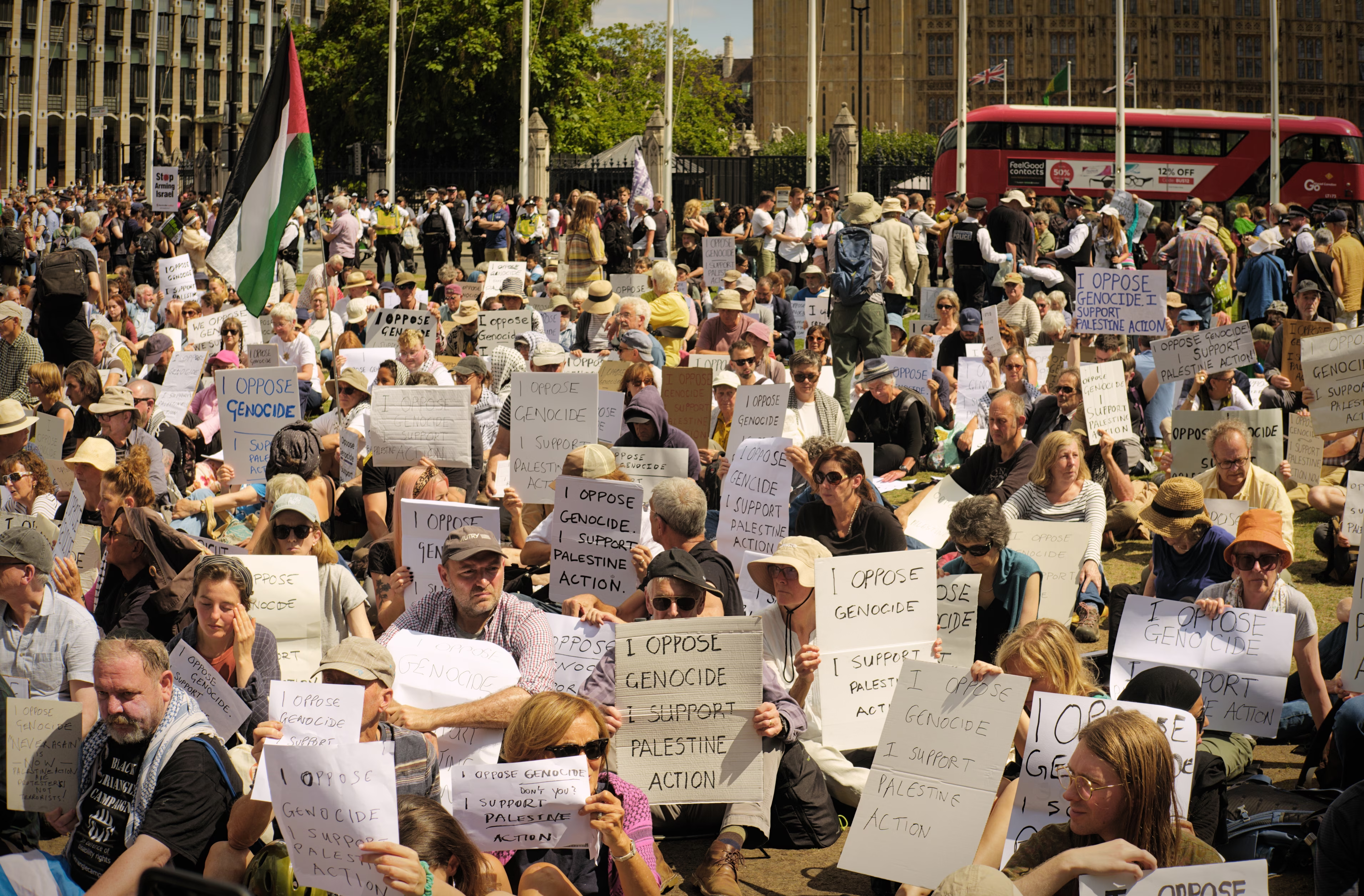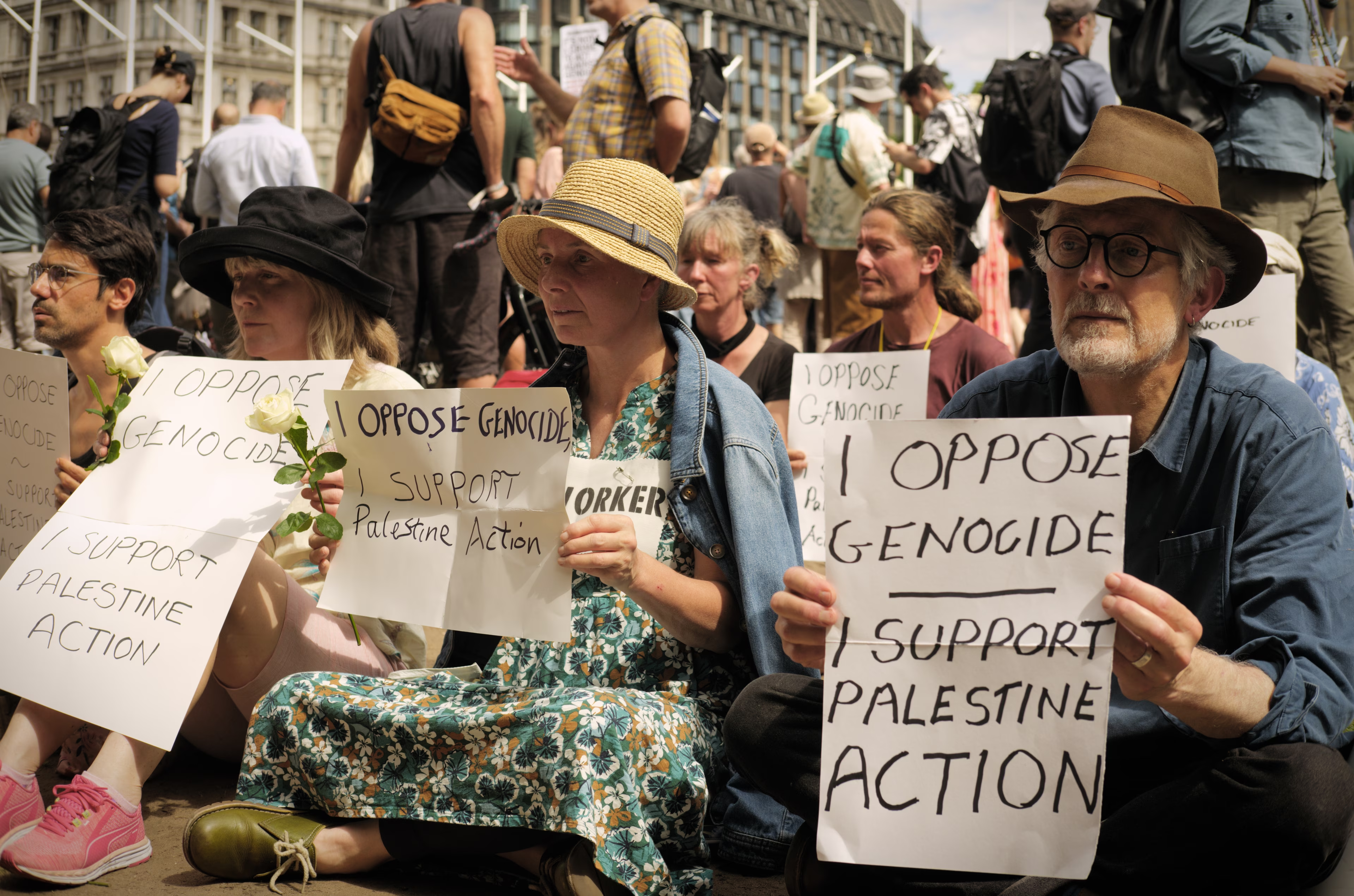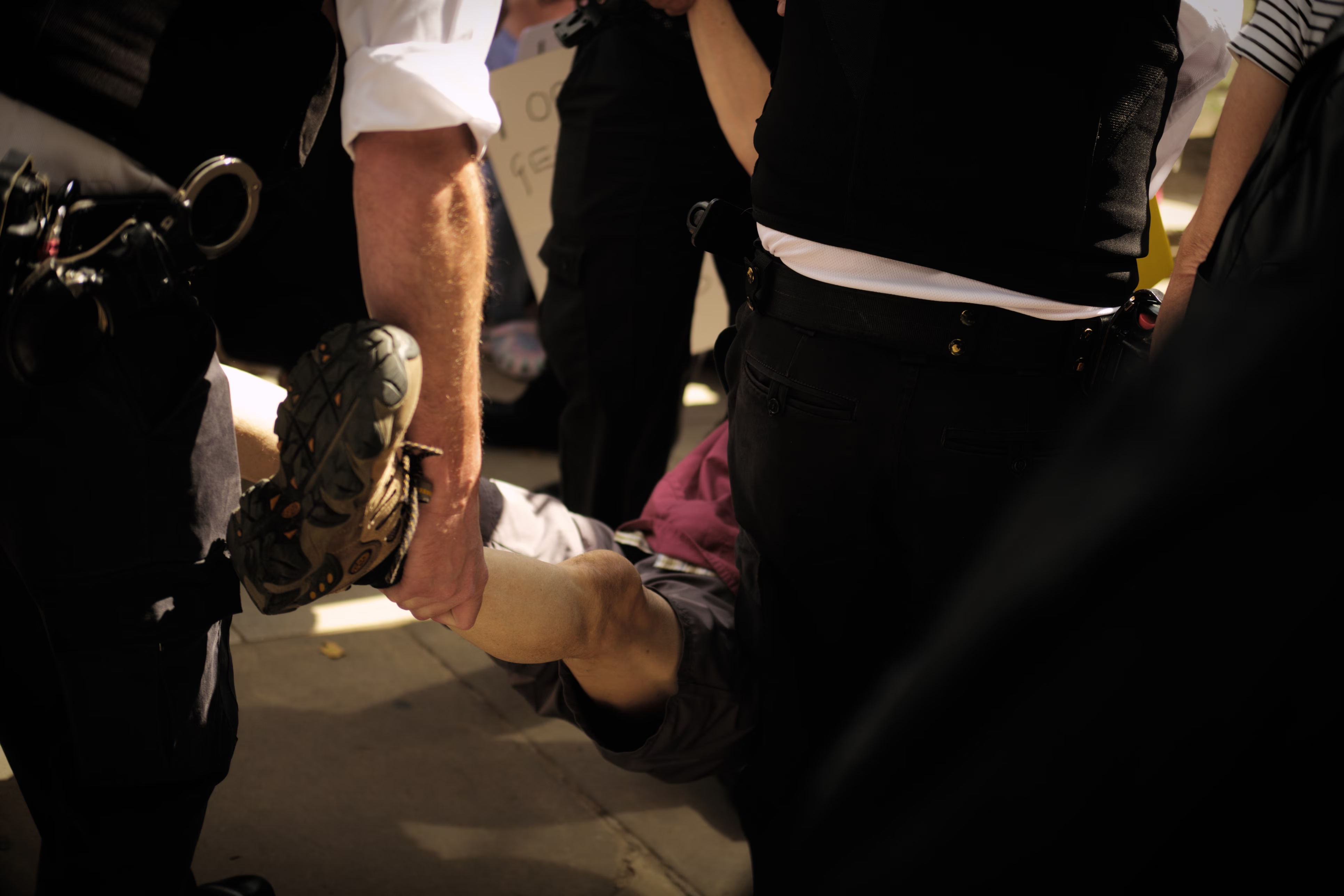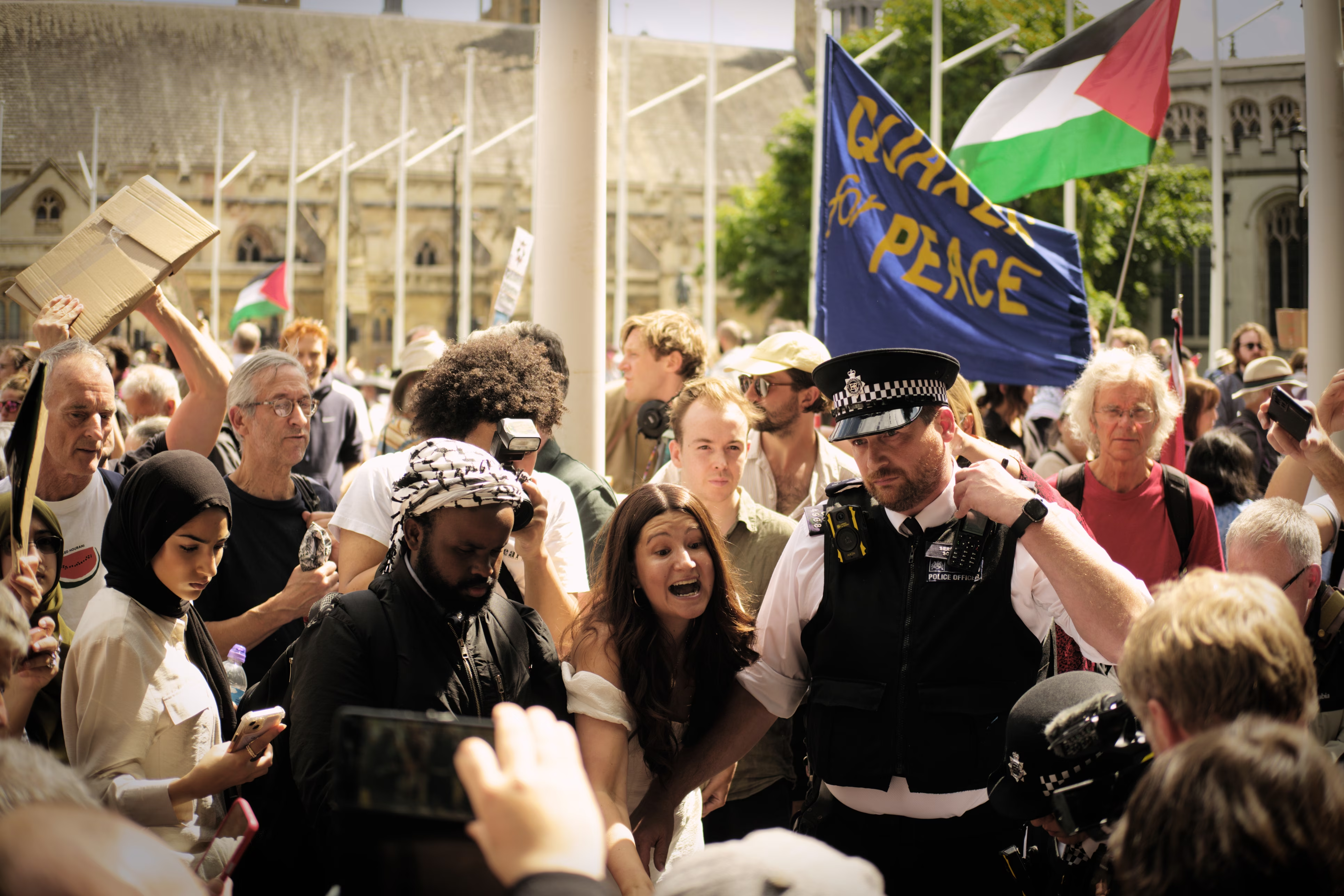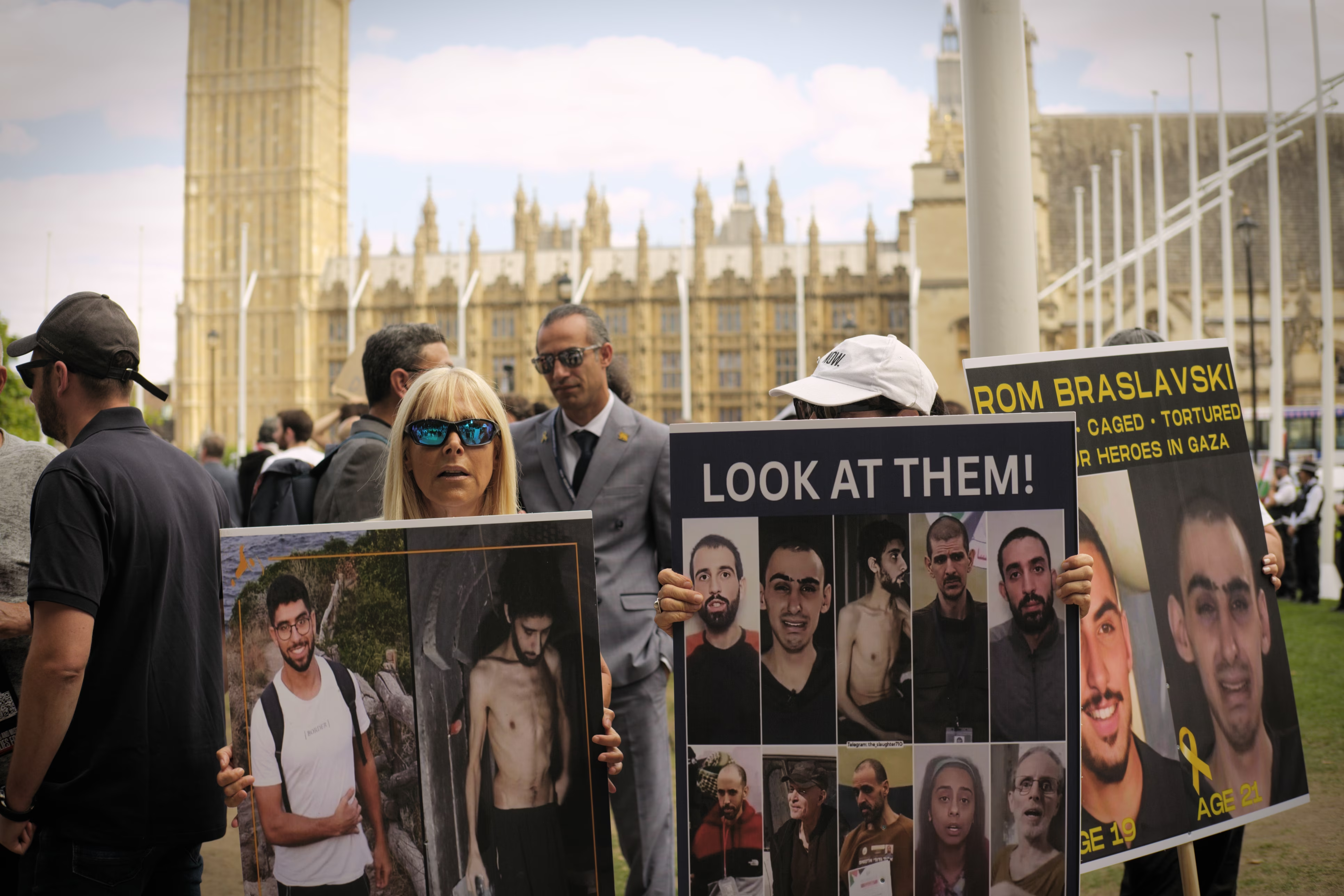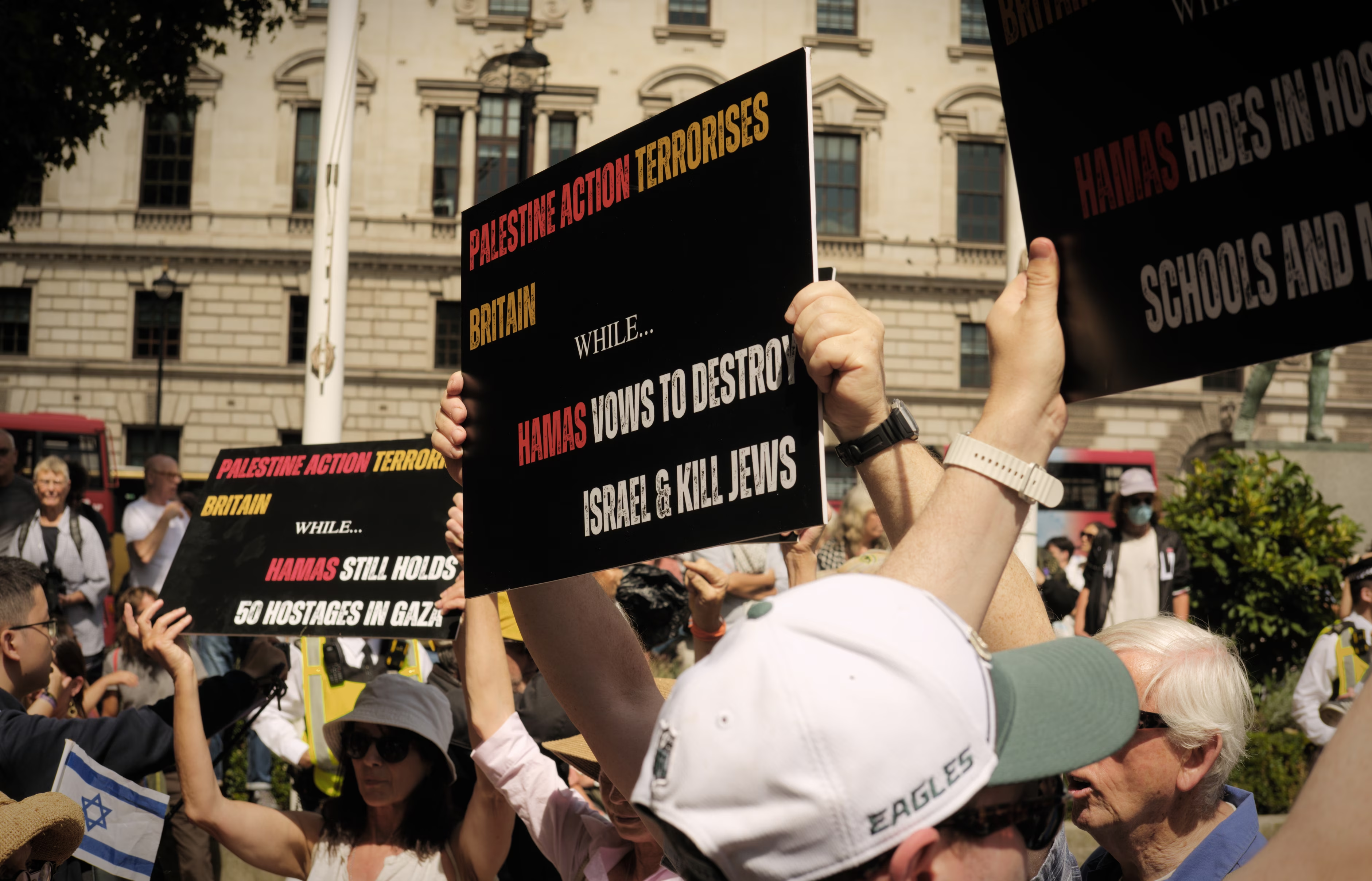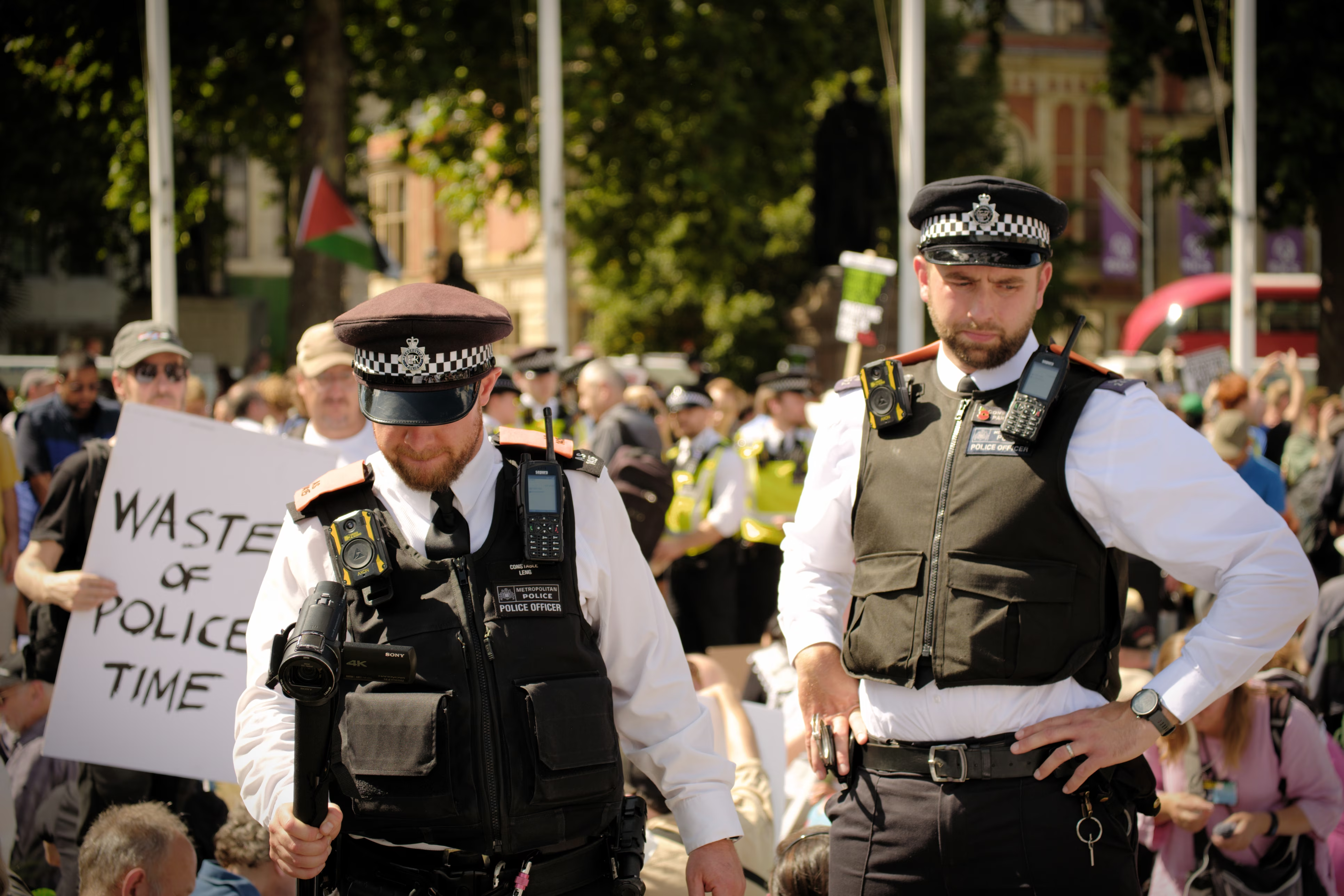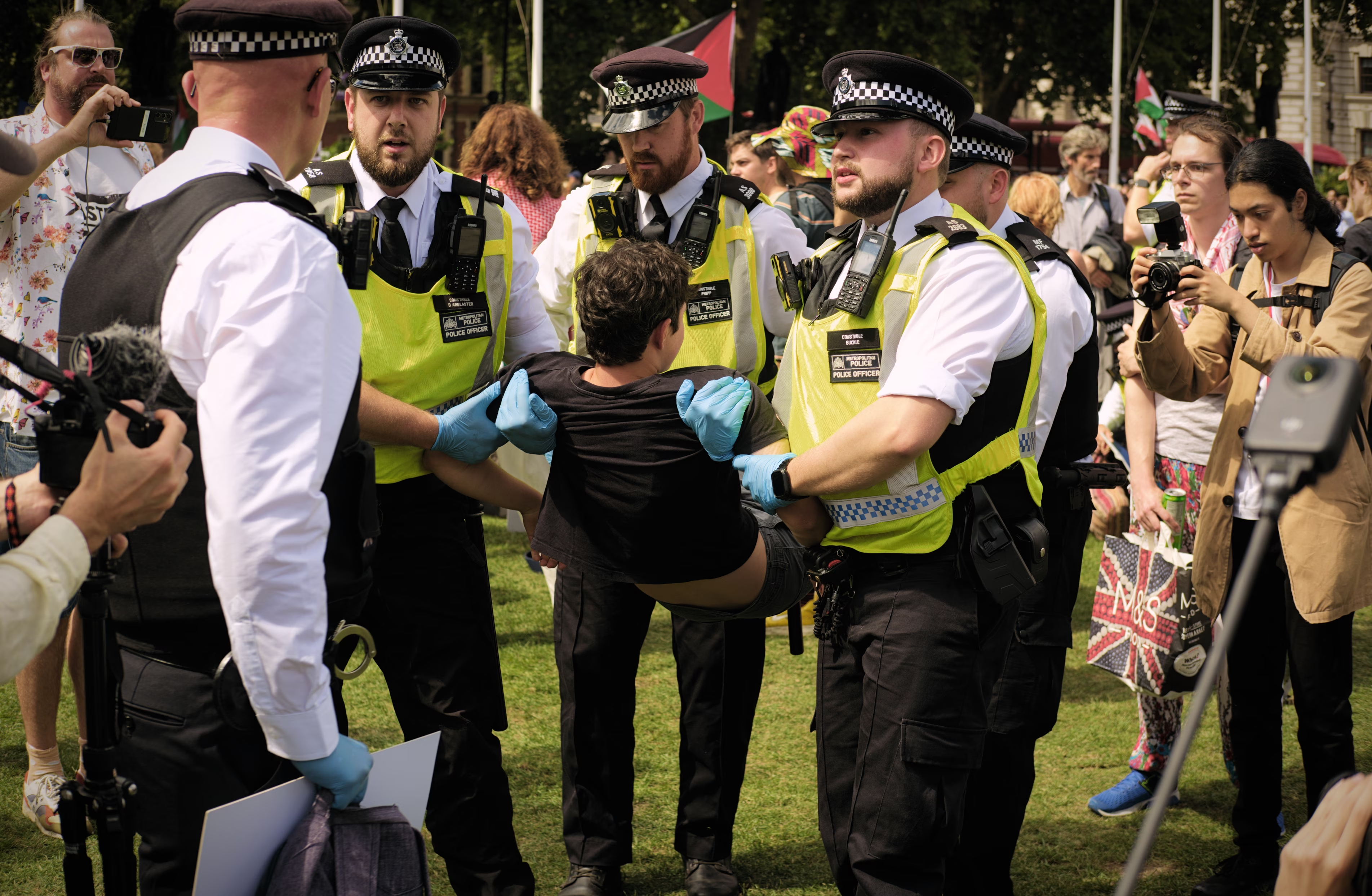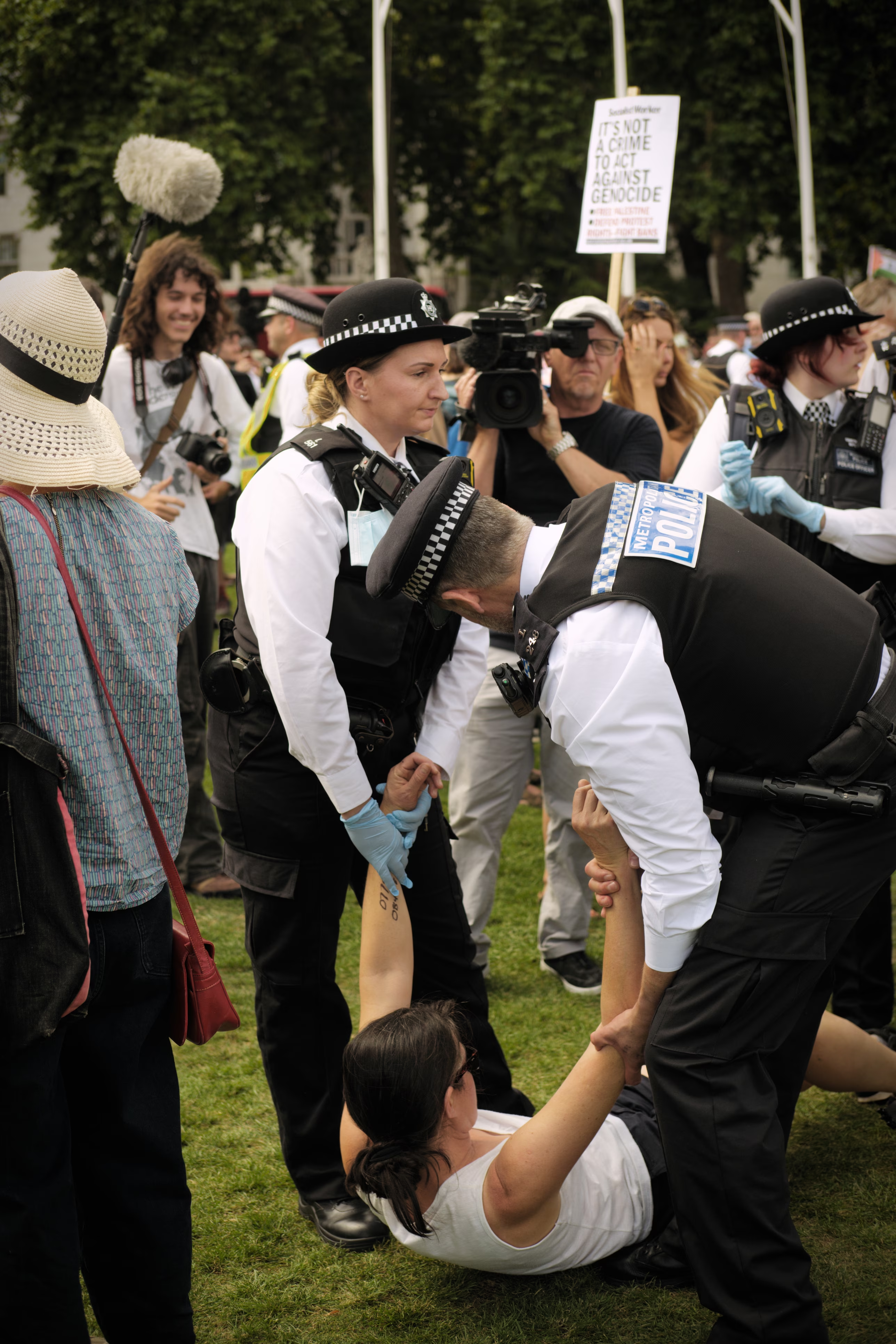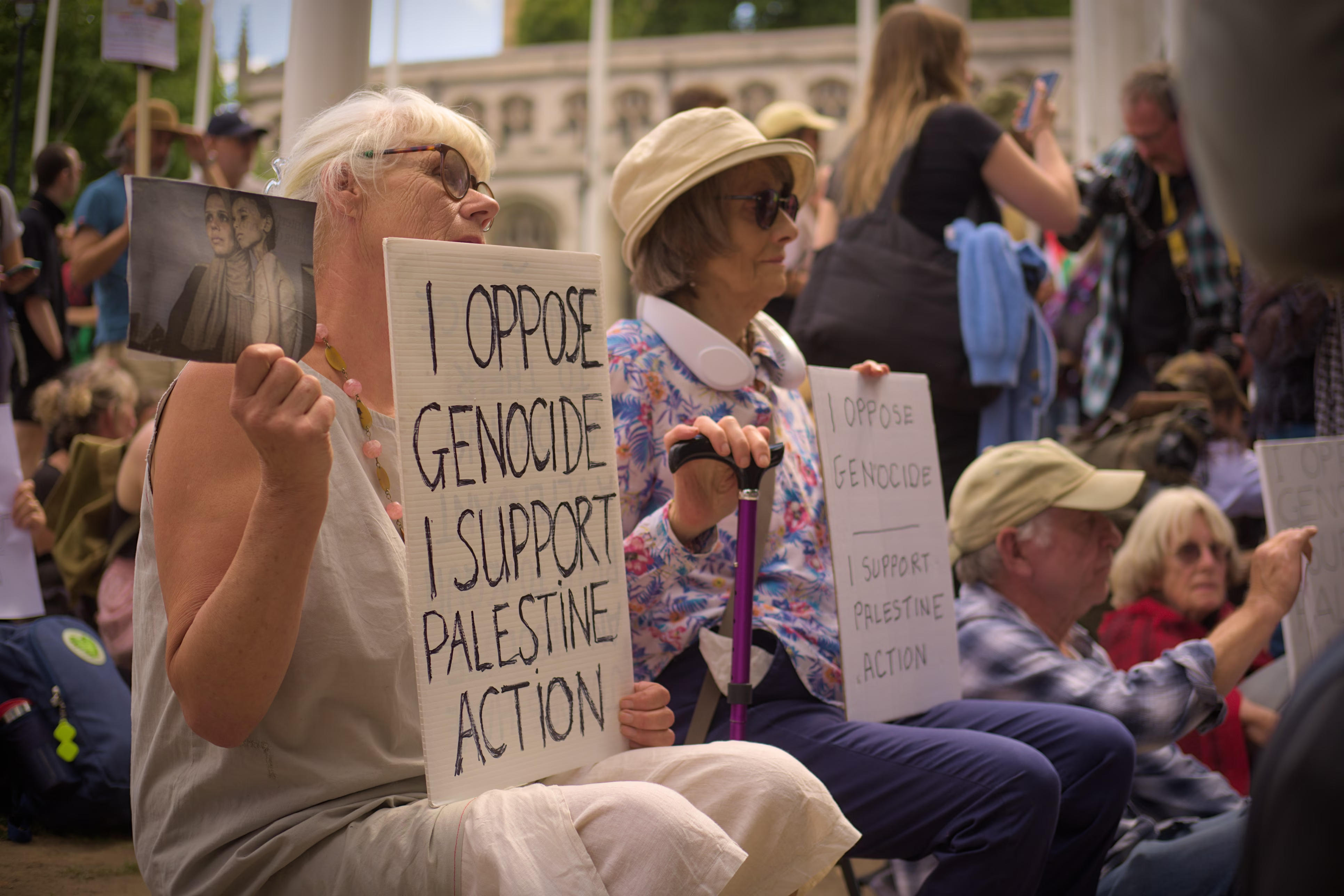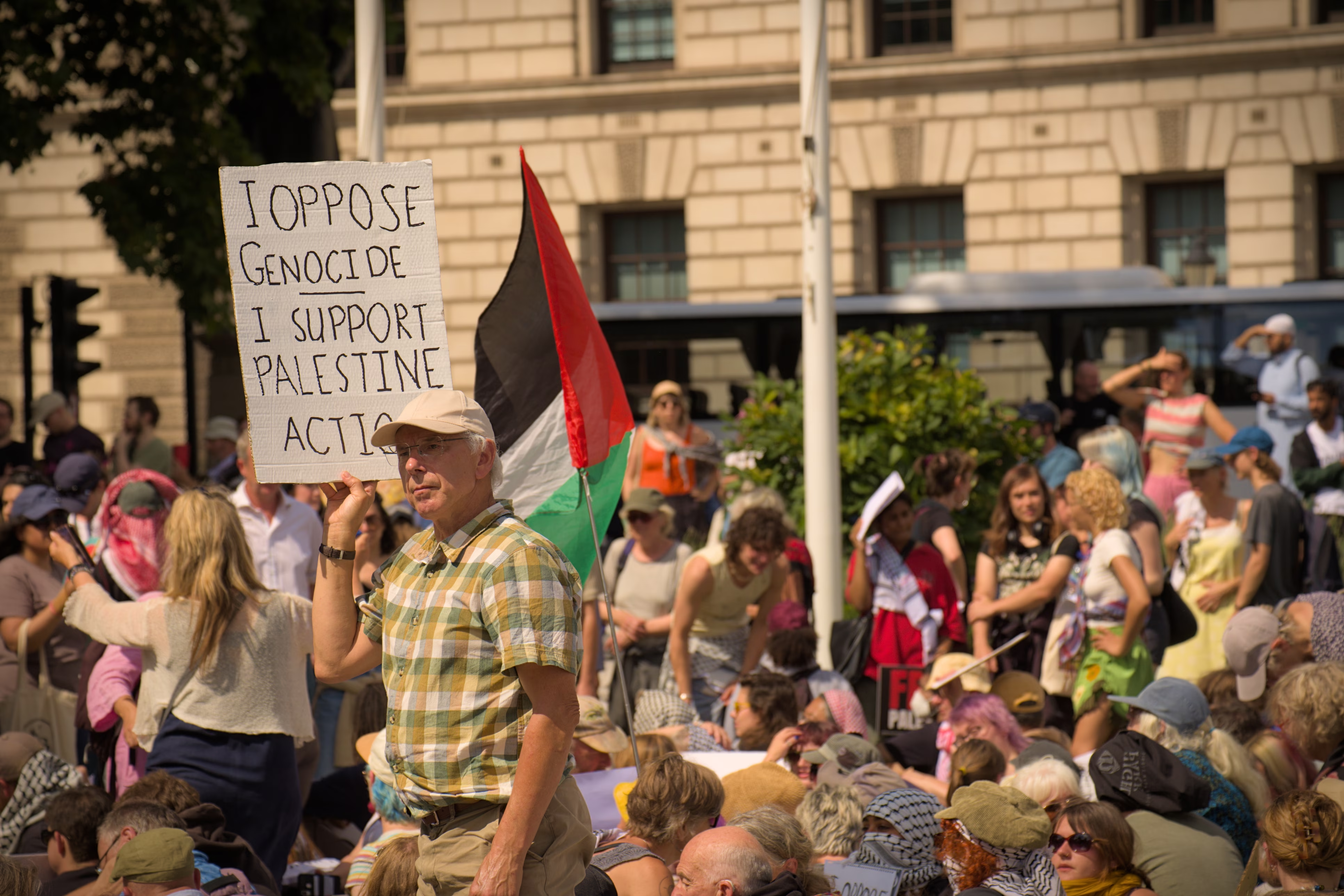
I decided last weekend to go to the Defend Our Juries Lift the Ban protest in Parliament Square. I am generally supportive of the Defend Our Juries group. They advocate for jury nullification in cases involving climate protestors. I love the concept of jury nullification as a tool of the populace to centre justice in the application of law. It’s one reason why I’m wary of prospective plans to reduce the use of jury trials as a means to ensure the justice system’s survival after the profane cuts it saw through the Tory years.
In this case, they’ve switched their focus to the proscription of Palestine Action, which involves not only banning the group but also banning expressions of support for them. I haven’t made my mind up firmly about where I stand on that latter aspect of the proscription, but I decided to pick up my camera despite having fallen out of love with protest photography lately, every protest being a de facto Gaza protest I’m not inclined to shoot. That deserves a post of its own at some point, but the main gist of it is that I don’t feel a kinship with this protest movement at all.
For me, before I (mostly) stopped attending protests for Palestine in 2014, I felt like I knew what everyone wanted. There was a peace process underway — albeit a troubled one, marred by Hamas overthrowing the nascent democracy in the PLC and frequent Israeli incursions despite their withdrawal — and I thought everyone was on the same page about the two-state solution, the idea that Palestinians could have their own state peacefully existing alongside Israel, that it could be democratic, and that Palestinians could be free.
I believed that then and I believe that now, and I’d be happy to protest alongside others if I thought that’s what they believed in too. Along the way though, I got the sense that others don’t believe that. Many don’t want a two-state solution. Two decades ago the idea of a one-state solution was of an expanded Israel in which Palestinians could live peacefully and freely, akin to the two million or so Palestinian Arabs who live in Israel today. It was unrealistically naive then; today, absurd.
Rather, I get the sense that those who want a one-state solution today want a country named Palestine encompassing Israel, rooted in the historical misapprehension that often gets conveyed as a Palestinian state once having existed and been invaded and stolen by Jewish people. Sometimes associated with that, sometimes its own separate thing, I see folks with a disdain for the necessity of such a state being liberal, democratic, or liberal-democratic.
Those differences alone make it hard for me to feel any alignment with those protesting today, let alone the unseriousness of those present, the unrealistic nature of their demands, their ignorance of history and the wider implications to what they want for the world, and the anger, spite, hostility, and undercurrents of racism and antisemitism.
The recent proscription order against Palestine Action complicates things though. I support banning the group. It’s a group that existed solely and explicitly to commit crimes. The sanctity of the right to protest — to associate with like-minded people, to express one’s views collectively, to publicly stand for what one believes in — does not lend its nobility to those who feel it a right to do violence and damage in pursuit of their cause.
I think it worse so soon after an election in which their views were represented on the ballot and soundly rejected by the electorate. Like the far right, there is an attitude some folks have in a democratic society that their judgement should overrule the expressed will of the wider public. I am fascinated by the elaborate and innovative rationale folks derive for why their views, though always represented, never win elections. Many of them ultimately boil down to the vast body of the electorate being wrong, stupid, confused, or lied to. In any case, I love the leap of logic that turns their failure to persuade society to vote for them into a rationale for getting what they want through unlawful means instead.
Some folks call attention to other proud historical movements that did pursue crime as a way to achieve their goals. I acknowledge that, but note also that even among those who knew what they were doing was illegal and chose to face justice for it anyway in pursuit of their cause, there was never any suggestion that what they were doing should be legal. Society simply can’t function on the basis that if you think you’re right and morally justified that you’re free to do whatever you like contrary to law.
Banning the group then sits fine with me. Proscription is a rare mechanism in our system, some centuries old and contradictory to the long history of British liberalism, but rarely employed until the Terrorism Act of 2000. The law intended to target groups like Al Qaeda was a careful compromise, one that allows groups themselves to be banned and for anyone supporting them to be guilty of an offence. That makes sense when applied to groups dedicated to Islamic terrorism and neo-Nazism, things we can as a society decide hold absolutely no merit and ought not be publicly considered.
With Palestine Action, that’s the part that I find difficult. Banning a group solely dedicated to doing crime, sure; banning anyone who expresses support for them, I’m not so sure. It feels inherently hostile to the nature of our liberal society. A person can’t legally sit with me and argue Palestine Action’s cause on merit. Were it a defence of terrorism, I can see the virtue in that. A defence of direct action though, long rooted in our history, I feel like that’s something worthy of public debate and discussion.
So I decided to go along to this protest. I note that there is absolutely nothing preventing people from protesting in support of Gaza and the wider Palestinian cause, nor against Israel, in favour of peace, or anything other than supporting the specific organisation Palestine Action. The people assembling at this protest were instead committing to willfully get arrested for supporting that group, and that’s something that I not only found appealing in a way the Gaza protests more widely don’t, but also something I think is likely to be considered an important moment in our future history.
Arriving Early
My modus operandi for protest photography had always been to arrive early. I liked to get my bearings, speak to people about their plans and how they see the day going, and establish myself as someone who’ll be running around with a camera.
I headed directly to Westminster on the tube around 10am, with the protestors having agreed to reach Parliament Square by 12:50pm. On my carriage, I chatted to some people bearing blank white signs. They were heading to St James Park first for a planned organised protest or march beforehand. I wasn’t interested in shooting that, so headed directly to the square.
I stopped at a pub nearby to get myself and my gear in order, and ended up having a gin and tonic with some elderly ladies preparing to protest. One of them was celebrating their birthday that day. We didn't talk about the cause much, just how I was there to photograph it rather than protest. "I just think it's wrong," the birthday celebrant told me. I didn't see them for the rest of the day so I've no idea if they got arrested or not. That's quite the birthday if they did though.
Around 12:30pm, I thought things were going to be a damp squib. The crowd was large, but signs were limited mostly to those of the legal variety. I tooted on my Mastodon account that I wasn’t expecting much, having seen only a handful of blank signs and those reading, "I oppose genocide; I support..." with the last two words omitted. What a strange circumstance where signs in that state are legal, but adding in two more words makes them unlawful.
Off to one side, I paused by a man painting umbrellas with various messages of support. "Why?" was his main message. He told me he was a veteran and he found this important. He was frustrated that the woman who’d placed the placard above decrying a two-state solution had placed her stuff near him. "Can you get your bullshit away from me!?" he told her forcefully. "It’s not bullshit!" she said. "I’m a veteran and I’m trying to do something serious here!" "I’m a veteran too!" the aged, dreadlocked, seemingly crazy lady declared as she began arguing with a wider group of people supporting the veteran.
By 12:45pm I knew I’d been wrong about numbers. Dozens of blank or half-prepared signs were out, and the protestors organised themselves into groups that sat down on the grass and the step surrounding the square ready to go. By 1pm, they were in their hundreds, and in short order scrawled the finishing touches onto their signs.
The police had surrounded the entire square with a loose perimeter, then there were tight groups of approximately 20 officers each stationed at 2-3 points around the square. Their process was to move in one or two at a time to have a conversation with each person. They asked them if they supported Palestine Action, if they were prepared to be arrested, if they’d walk away of their own volition or not. Some answered, some didn’t. Some agreed to walk away to be arrested, some didn’t. Those who complied were walked out by two officers at a time. Those who didn’t saw a group of six or so officers wade in from the large groups nearby and carefully pick them up by the arms and legs to carry them away.It’s perhaps worth mentioning at this point that virtually everybody there to be arrested seemed to me to be an elderly person. The reason is obvious, I think. As with arrestables at other protests, it’s the older, more middle-class folks who have sufficient security in their lives to be able to endure the consequences of being arrested. Those who’ve had their careers, paid off their mortgages, had full lives with little else to worry about. There were far fewer youngsters, likely with far more precarious lives than their elderly counterparts, but not an insignificant number. I hope they know the consequences they’re going to face for the rest of their lives as a result of this, and I commend their courage if they do.
The Melee
As the signs got completed and unveiled, I looked around for the first arrests. In moved a group of police alongside the square by the Fawcett statue. I dove in to get as close as I could to start shooting, careful to stay out of the way of the police. In amongst them, I missed my old X100V and some of my toy film cameras, and I missed most of the shots I went for having only my 35mm f/2 as my closest lens.
I’ve had my share of rough experiences at protests, but I quickly realised I didn’t want to be in this melee. Every time a group of officers came in to make an arrest, they were surrounded by a large gaggle of protestors following them, screaming in their faces. Some of it was in the bounds of normal for such things. "Is this what you signed up for?" "How do you sleep at night!?" Things of that nature.Much more of it was laced with vitriol and foul language. They supported babykilling. They were genocide police. They were doing Israel's bidding. They were fascists, Nazis, just following orders. All this spat at them with personal insults and swearing, often directly in their faces.
I watched one woman follow them around through the day, purposefully getting in front of them, screaming hysterically. Another did much the same, but instead banging a small saucepan with a wooden spoon. At one point, she was following the same officer around for half an hour, the pot a few inches from his ear as he was arresting folks, somehow stoic in the midst of a noise that was driving me nuts from metres away.
I was pushed around several times. In the gaggle with some other photographers, I felt folks pushing at my back trying to force me to bump into the police officers. Others barrelled through me as they fled officers looking to speak to them or as they tried to throw themselves into the fray. At one point, someone rammed into me, reaching past me over to where an arrest was taking place, leaning over with their armpit in my face as they pointed their finger directly in an officer's face while calling them a fascist cunt.I lack the language to describe how hostile it felt. At one point I messaged a pal to say I thought it was an inch away from boiling over. One of the big groups of officers moved in right next to the maelstrom, apparently sensing the same. I decided to get out of the fray, and mercifully saw quickly that the officers moved away too, their mere presence having calmed things down.
I decided to take a few minutes at the calmer part of the protest, where the grassy square was filled with quiet protestors sat calmly by their signs. I should note that through the day all the arrestables conducted themselves with dignity. They weren't in the fray. They sat there, their backs to the Houses of Parliament that had voted by an overwhelming majority in favour of the proscription, sharing water and sometimes chatting lightly, and accepted their arrests when they came.
The Counter-Protests
After calming myself, I wandered around the two counter-protests going on.
The first was a small group of people holding up signs showing the Israeli hostages. Most of this group were silent, some clearly Jewish. Some protestors nearby tried to engage them in conversation, a sort of real-life sealioning I've often seen at protests. Usually, that's a futile effort to try to persuade people to change their minds. I used to admire the patience Femi Oluwole had at brexit protests doing so with Brexiteers. This one though had a different tone. "Are you Jewish?" I heard asked. "Who funds you?" was common.
A small gaggle of folks near them stood and defended them, engaging with those trying to crowd around them and interrogate them. One of these was loud, brash, but polite. "This is meant to be about the proscription; why does the sight of the hostages bother you?" I heard him saying. To some others, I heard him saying, "Don't insult the police, they're doing their job. They're enforcing the law; your issue isn't with them, it's with the law." The small crowd nearby continued haranguing him, with clear vitriol that he seemed to be able to move past gracefully. I'm not sure I could have, seeing how they were and knowing how fragile I can be.
This counter-protest was the calmer of the two, though later on I wandered by again just as a fight broke out. I didn't see how it started but one was clearly a protestor and the other a counter-protestor — I think though I'm not sure that the latter was the brash man I'd seen engaging with the crowd. I saw the protestor fall to the floor on their back and lie there with his hands up as the police surrounded both and carted them away.The second counter-protest was at the other corner of the square, where a small group held signs decrying Hamas. These folks were engaged more fully with the crowd around them, arguing and debating. Here things were much less calm. "What's your connection to Israel?" someone shouted at them as I approached. The conversation quickly devolved to being about how they were funded by Israel.
I've always felt at these protests that there's an undercurrent of antisemitism folks lie to themselves about. Everyone tempers their language just enough to make it seem defensible, to frame it like it's legitimate criticism of Israel. It's like a crude little game, a nod and a wink to those in on the joke. It's why I can't take folks seriously when they claim never to see it. Every instance reported in a newspaper is just an isolated one or two people; it's not the vibe they claim to experience. I just can't take that seriously.
Someone shortly after commented on the antisemitism. "We're not antisemitic!" an aged hippie-styled woman declared. "We love Jews! We love Jewish people! Just not Zionists!"
The Main Protest
I spent the rest of the afternoon wandering around the sitting protestors.
At 2pm, as the 1-hour stated time of the protest expired, a cheer went up and all the sitting protestors stood for a moment and applauded themselves. Some began to leave, but most stayed.
Through the day there'd been at least one pair of officers wandering around with a video camera through the field of sitting people clearly capturing their faces and their signs — so I'm going to guess a great many people who left early while unarrested will be having some unwelcome knocks on their door from the police this week. At one point I stupidly posed for them next to the person I was chatting with. We were both photographers and mercifully neither of us had any signage or anything indicating we were with the protestors.
Everything proceeded calmly. Officers acted as I described above, coming in as a pair for a conversation with a protestor one at a time, then either walking them out to be arrested or calling in a group of their comrades to help carry them out. After a couple of hours, they had this down to machine-like efficiency, with three or four groups of officers moving in and out at a time. Some folks tried interrogating the police officers. I heard a very British question about whether they'd conducted the appropriate risk assessments, referencing some piece of Metropolitan Police policy. I heard questions about specific ECHR provisions, sections of the UN charter, and elements of the Terrorism Act and specific rulings and judges' comments. The officers rarely replied at all.A few times I found myself in the way of the advancing groups, buried in my viewfinder. An officer touched me only once, when I really missed the group approaching while staring through my 200mm lens, to usher me out of the way.
Slowly, the wider perimeter the police had maintained since before the protest began started to draw in. I saw people being turned away from an ever-tightening ring around the sitting protestors. Around 3pm, I was stood among the sitting sign-holders, with no room between them and the perimeter anymore.
I had my shots and had friends to meet for some much-needed whisky after the earlier raucousness. I left the perimeter and sat on the wall at the edge of the field to stow my gear and write a little in my journal. At some point, a lady approached and asked, "Is that yours?" pointing at one of the unlawful signs leaned against the wall next to me. "No, that was here when I sat down," I said.She left after a little moment and as I continued to scribble in my notebook it occurred to me it might look like I was a supporter from afar. I glanced around for any police looking my way and saw none, and I desperately hope those I saw filming the crowd didn't capture me sat there like that in a way that might be misconstrued.
Sheepishly, I reached down and turned the sign around. I looked up to see an old woman looking at me with an accusatory glare.
My Thoughts
Over many drinks, I discussed the day and the wider issue with some friends. I'm always wary when my mind isn't changed by unfolding events, but I'm confident in my position still.
I've always been a liberal hawk. One part of me that feeds my perspective on this issue is that I think liberal-democracy is the only legitimate form of state authority, and I believe that anything else is intolerable and the use of military force to free folks from authoritarianism can be justified.
My Mastodon followers will know I have a weird, obsessive love of Parliament too, and that I've had a career that has spanned the defence industry and sometimes crossed over into law enforcement. That is to say that unlike many of my peers on the left I don't view Parliament and the rule of law with hostility, that I have a ton of appreciation for the legislative process and for good governance, and even a fair appreciation for our place in the world and the importance of our military capability and diplomatic influence.
That leaves me in a strange position with this issue. I don't identify with the Gaza protestors, even though we both want an immediate end to the looming famine, for an end to hostilities, and a free Palestinian state. To me, a free state must be democratic, must abandon rocket attacks and terrorism against Israel, and must utterly extirpate Hamas.
To others, all three of those things seem optional, unimportant, irrelevant to their cause. Worse, those opposing genocide seem pretty comfortable with accepting the genocide in Sudan, the recent genocide in Tigray, and even supportive of Houthi Yemen, who've overthrown their democracy, instituted slavery, and expelled or killed every Jewish person in the country — to say nothing of their apparent intentions toward Israel alongside the other members of the Iranian axis of influence.
I try to remind myself when thinking of the sheer hostility and vitriol at these things that to the minds of those involved they are virtuous fighters for a cause that's an absolute moral imperative. To them, there's either apartheid or a genocide or both going on, comparable to South African apartheid or the Shoah, and they're absolutely convinced history will view them favourably. It's the greatest issue of their time, the most pure moral test, the clearest crucible imaginable. Their hostility and vitriol, their misinformation and weirdness, I'm sure it seems to them to be born of empathy and compassion, of moral duty.
I remind myself of that because otherwise it looks a lot like an ugly zealotry.
My position becomes stranger still with the proscription itself. I continue to support the ban on Palestine Action, and I continue to struggle to accept people being arrested for supporting them. I can understand and even appreciate those choosing to be arrested in protest of that side of proscription, but I can't escape their attachment to the cause of Palestine Action itself.
I try to be a consistent liberal on these issues (and every other issue), but I'm lost on how folks can support that group. There are dozens of other Palestine-supporting organisations, ones that don't exist solely to do crime. Do folks think their crimes are justified? Do they think society should be organised in such a way that destroying property and impairing our national defence capabilities is justified if you disagree with how they're used?
I know from speaking with some of their sympathisers that they do, the rule of law and the ballot box be damned.
Worse still is that the Home Secretary and Prime Minister have indicated that there is more to the group's activities than what is publicly known. What is publicly known is that Palestine Action arranged ~400 or so actions, and all but a handful resulted in arrests — ~900 in total, increasing over time as they became more and more radicalised. One wonders what further escalation they were seeking. Some suggestion has been made, not yet confirmed with publicly-available evidence, that they were moving toward targeting Jewish-owned businesses, and both the Joint Terrorism Assessment Centre (JTAC) and Proscription Review Group (PRG) recommended the group be proscribed.
For my part, the best argument against the proscription I heard was that those 900 arrests proved we didn't need to ban them. Indeed, many other groups in the past have committed comparable crimes for comparable causes, including attacking military infrastructure and capabilities, and were arrested and convicted for them absent any proscription
That is a good argument. I think if Palestine Action had a legitimate side as their comparable predecessors did, that argument would hold some weight with me. If they arranged peaceful protests one week and direct action every other week, there'd be good reason to allow them to continue to exist in a free society — the nuance over what non-public detail we don't know yet aside.
A group solely dedicated to criminal enterprise though, I rather see the pragmatic virtue in preventing their crimes ahead of time. Indeed, it feels to me to be closer to the idea of pre-meditated 'conspiracy-to-commit' offences than it does to legitimate protest. If you know a group only exists to plan, advocate for, and commit crimes, with absolutely no legitimate purpose other than that, what is the virtue in civil society allowing them to continue to operate?
It's banning the expression of support for them that niggles at my soul. I am incurably liberal, and it really feels like this is a thing that should at least be arguable.
I think a good compromise would be new legislation to allow proscription outside of the Terrorism Act. I am confident that Palestine Action falls within the scope and definitions of that Act, and I predict those pinning their hopes on judicial review are likely to be bitterly disappointed when it completes (and even if they aren't, I'm certain Parliament would amend the law as appropriate in the event of a surprise defeat), but on liberal principle alone I really feel like an alternative proscription mechanism that bans the group without banning expressions of support for it would fit neatly here. Stop the group from committing crimes, but allow free debate and discussion featuring those on their side. I'd be surprised if there weren't other cases where such a form of proscription would suit.
For my part, I enjoyed the day overall. It was nice to shoot a protest again, and though I was a little shook by the hatred and vitriol on display, I also had glimpses of dignity and fraternity among those choosing to be arrested. I think I'm right in my guess that this is a pivotal moment in our future history, and one I'm glad to have shot and I'm sure I'll remember forever. A follow-on protest is planned for September, aiming for at least 1,000 arrests. I may well go along to that.
I'm still absent any inclination to be associated with these Gaza protests, but I find myself sympathetic to this specific slice of it around arresting folks for holding signs expressing opinions — as being a consistent liberal demands.
